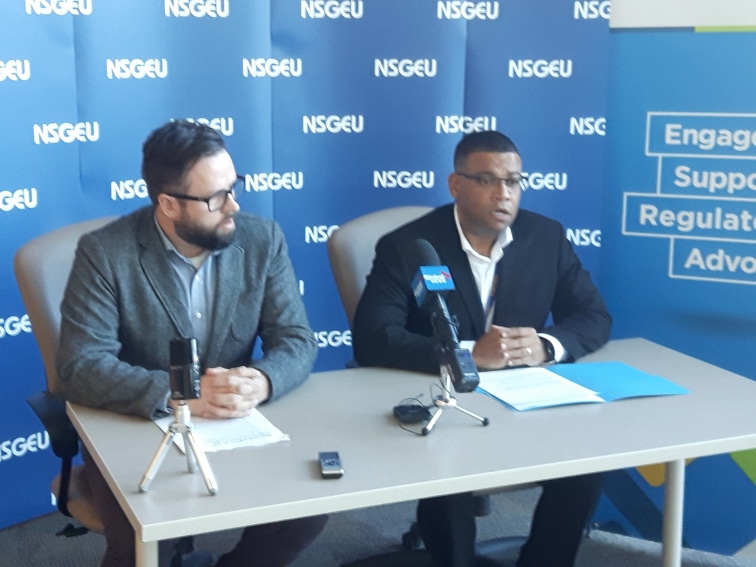
KJIPUKTUK (Halifax) – Child welfare services in Nova Scotia are underfunded to such an extent that Nova Scotia’s most vulnerable families are suffering.
That was the urgent message delivered in unison by Jason Maclean, president of the Nova Scotia Government & General Employees Union (NSGEU) and Alec Stratford, executive director of the Nova Scotia College of Social Workers (NSCSW) at a press conference this morning.
“We continue to see how our members on the ground go above and beyond their duties trying to hold the child welfare system together,” Stratford says. “Social workers are there to work with vulnerable Nova Scotians, but without the resources they are struggling.”
“Child welfare is on the brink,” says MacLean, pointing to 2015 layoffs in Barrington and Guysborough, and closure of the Sheet Harbour Community Services office. The NSGEU represents social workers in the department of Community Services and in health care.
“We have a shell game of sorts, people are moved from region to region, and there is a high turnover of social workers. As a result there is a ton of overtime, but nobody can work day in day out for 16 hours a day. We should look at that money spent on overtime and use it to hire more people,” MacLean said.
#childwelfareonthebrink, a new campaign
The NSGEU and the NSCSW joined forces to create a website, childwelfareonthenbrink.org, that highlights the many hardships vulnerable families face after years of government austerity.
The aim is to get Nova Scotians to take to social media to spread the word and increase pressure on the government to allocate the necessary funding. Billboards in Halifax and Sydney and transit advertising are also part of the campaign.
The website shows how caseloads have increased, new legislation has raised demands on staff and lead to increased complexity, resulting in workers’ burnout, and a high staff turnover.
Extensive paperwork, lack of administrative support, and gaps in culturally competent service delivery to clients and children of African Nova Scotian descent are some of the other issues raised on the website.
Increased caseloads and increased complexity, yet insufficient resources
“In terms of caseload, over the last 20 years the reality on the ground has shifted quite radically. At one point in time a case might have been an issue of food security, now it is food security mixed with mental health, with housing issues, addiction issues, and complex traumas,” says Stratford.
“It takes an entire team to manage that complexity, and expecting one social worker to try to do all of that is unsustainable and unrealistic if at the end of the day we want to keep families together and to keep families safe. And that after all is what it is all about,” Stratford says.
Who is really to blame?
Frustrated clients have directed their anger at the departmental workers, but that often isn’t warranted, both MacLean and Stratford emphasize.
“Let’s keep in mind that these are probably among the toughest jobs you can do in this province. On a day to day basis you are sitting with families at their worst, and you are asked to connect with them, to empathize with them and to find meaningful solutions. That that takes skills and that takes time. If we don’t give these workers adequate time to be with families and understand the context, then we are not doing them justice,” Stratford says.
MacLean agrees.
“What we hear as well from our members is that the system is set up to tie the workers’ hands. There are rules in terms of how much funding you can receive, and most of our members don’t think it is enough. The high caseloads also mean that they can’t go out and visit people as much as they should and assess families properly,” says MacLean.
Except in the most horrific circumstances children actually do better with their parents
“Parents often wind up in the child protection system because they make mistakes, not at all because they don’t want their children. All the research and all that we know is that except in the most horrific circumstances children actually do better with their parents,” Jackie Barkley tells the Nova Scotia Advocate. Barkley is a registered social worker who provides services to families and children who are caught up in the child welfare system.
Yet insufficient funding makes it more difficult to meet that objective.
“Clients have the right to see their children for a certain amount of time when the state has them in care. That’s good and important, in order to get the child returned to their care, and to sustain a relationship with the children. The new legislation provides for increased visitation, but does not provide sufficient resources so people can actually see their children. That’s just a single example,” Barkley says.
As well, the problem of underfunding far exceeds just the child welfare system, Barkley explains, as she calls for an immediate raise in income assistance benefits, increased accommodations for decent housing in a very tight market, free transportation, and so on.
With a special thanks to our generous donors who make publication of the Nova Scotia Advocate possible.
Subscribe to the Nova Scotia Advocate weekly digest and never miss an article again.




I agree that the system needs more funding. It would also be beneficial to update the policies to support evidence based practices. I have a few close friends who have had child welfare interventions, and it would have been beneficial to have had their bonding and connection with their children prioritized. It would also be helpful to have the workers deal with parents in ways that foster the parents self esteem and mental health. Unfortunately neither is always the case. So yes, perhaps more funding/decreased over time would lead to less burnout and therefore better practice. Even more so, could the system support healthier practices and could they champion families, we would see a decrease in trauma in generations to come.
Separating infants from their mothers because of a concern, is stealing critical bonding time that infant will never be able to get back.
A solution- based system instead of a crisis-based criteria would turn things around.Ask social workers,ask foster parents,ask biological parents….they have solutions….
Child-centered care for a family in crisis…and the staff…..and the foster families who step up..
Nothing else will springboard changes.
Nova Scotia Child Welfare does not require more funding. After receiving a termination order in June it’s abundantly clear what needs to take place. Stop immediately apprehending children without proper investigation for the “risk” of abuse. The more kids the Agencies take in, the more funding is required. Many children are being traumatized by being taken into care needlessly. Instead of apprehensions, Agencies should be working together with families to keep the families together. Studies show that children thrive much better with their parents. In my case the judge noted the Agency in Pictou County has twisted their notes, breached their Act in several areas, sought counseling for my family that the judge recognized was trauma caused by the Agency themselves, they did not assess my home before taking my children for 4 months, where they ended up being ABUSED by the foster parents, and everyone involved walks away unscathed without accountability. The trauma that’s caused by CAS is very real. Child welfare in Pictou County Nova Scotia needs to be reformed and externally investigated, not funded. A more collaborative approach needs to be taken, not a system that takes children for small to no reason at all and then attempts to keep the children in care for as long as they can to get that funding. This is the real problem with Child Welfare. Legal Aid, CAS and the courts are all getting paid in this evil circle. They’re all in each other’s pockets, it’s evident all across Canada. Birth alerts also need to stop. I’ve had one of those placed on me without investigating the claim from the “referral source” (my family believe CAS fabricated this referral source) that I was shooting heroin while pregnant with my son. I had to show the court my hospital records showing I was breastfeeding a healthy baby boy. Your Agencies need an external investigation badly for bad business practices. The Agents I had to deal with were very manipulative and evil. Stop asking for more money and work with families rather than trying to take children for money, which is called child trafficking!!